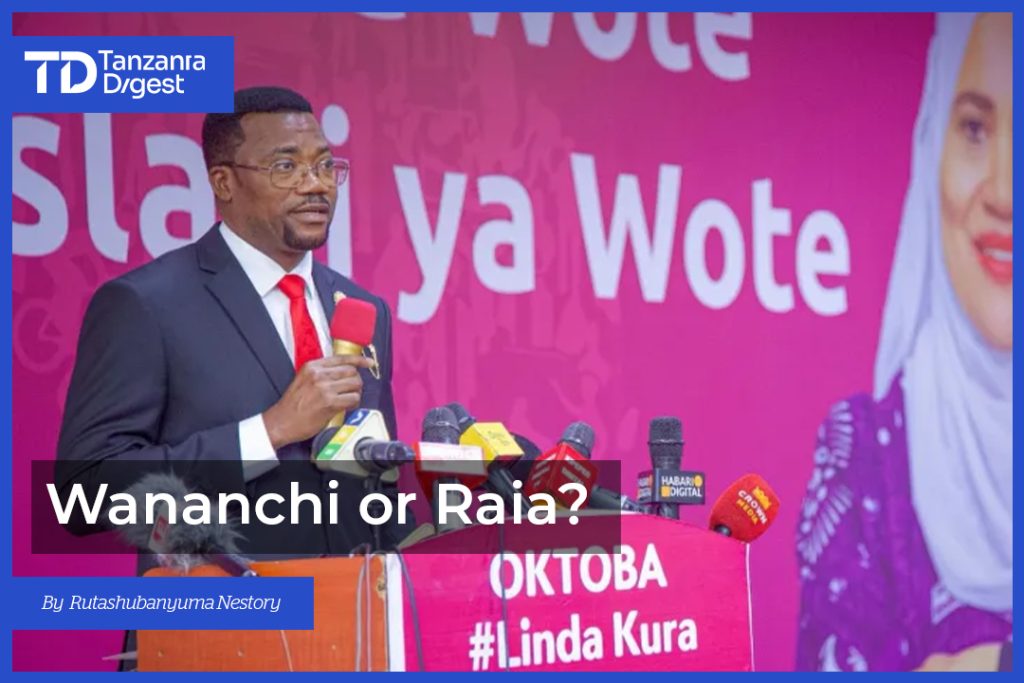Background of the Nomination Dispute.
The controversy surrounding “Luhaga Mpina’s presidential nomination” began when Monalisa Joseph Ndala, Deputy Secretary of ACT-Wazalendo for Dar es Salaam Region and Shadow Deputy Minister for Culture, Arts, and Sports, filed a formal complaint challenging the legitimacy of Mpina’s candidacy.
Ndala argued that Mpina’s nomination violated specific clauses of the party’s constitution, particularly citing “Clause 16(4)” requirements that presidential candidates must have been party members for “30 days prior” to nomination. She copied this complaint to the Registrar of Political Parties and the National Electoral Commission (NEC), urging them to enforce these rules, which would result in Mpina’s automatic disqualification if upheld.
This challenge came at a critical juncture for ACT-Wazalendo, just days after the party had enthusiastically welcomed Mpina, a “former CCM heavyweight”, who defected after being excluded from CCM’s parliamentary primaries for Kisesa constituency. Mpina joined ACT-Wazalendo on August 4, 2025, and was nominated as the presidential candidate on August 5, 2025, far short of the 30-day requirement cited in Ndala’s complaint. The timing of this internal challenge raised eyebrows among political observers, with some viewing it as part of a broader pattern of opposition fragmentation tactics witnessed in Tanzanian politics.
ACT-Wazalendo’s Legal Defense and Constitutional Arguments.
In response to the formal complaint, ACT-Wazalendo mounted a robust legal defense based on its “updated constitutional provisions”. The party leadership asserted that Ndala’s objections were based on “outdated party regulations” that had been superseded by newer documents. According to Abdul Nondo, National Youth Chairperson of ACT-Wazalendo, the clauses referenced by Ndala were from the party’s 2016 constitution, which had been formally replaced in 2024.
The party’s defense rests on several key constitutional arguments:
Current Governing Documents:
ACT-Wazalendo maintains that they are currently operating under the 2024 Operating Rules and the 2020 Election Guidelines, not the 2016 constitution cited in the complaint.
Revised Membership Requirements:
The party argues that the current requirement for presidential candidates only mandates membership for “at least 7 days before the date of the election process is announced“, a requirement Mpina satisfied.
Distinction Between Internal and Governmental Positions:
Party officials emphasize that the stricter requirements (including membership duration, asset declaration, and philosophical alignment) apply only to candidates seeking “internal party positions”, not governmental roles like the presidency.
This constitutional interpretation forms the cornerstone of ACT-Wazalendo’s defense against the complaint. The party leadership has characterized the challenge as based on “non-existent” clauses and has accused complainants of “misrepresentation and distortion” of the party’s actual governing documents.
Analysis of the Complaint’s Validity and Motivations.
A closer examination of the complaint against Mpina’s nomination reveals several essential dimensions:
Constitutional Ambiguity:
The dispute highlights potential “ambiguities in party governance” documents that leave room for conflicting interpretations. While the complainant cites specific clauses, party leadership maintains that these provisions no longer exist in the current constitution.
Political Motivations:
Many observers suggest the challenge may reflect “internal tensions” within ACT-Wazalendo following Mpina’s relatively recent defection from CCM. His rapid ascent to the presidential ticket potentially bypassed longer-serving members.
Strategic Sabotage Concerns:
Some analysts view the complaint as potentially part of a broader pattern of “opposition fragmentation” tactics in Tanzanian politics. Similar internal challenges have recently been used against CHADEMA, Tanzania’s largest opposition party, resulting in its exclusion from the upcoming elections.
Timing Considerations:
The complaint’s timing, filed immediately after Mpina’s nomination and just months before elections, suggests it may be strategically intended to “disrupt campaign momentum” and create uncertainty around ACT-Wazalendo’s presidential ticket.
Political Context and Broader Implications.
The dispute over Mpina’s nomination occurs within a “complex political landscape” characterized by increasing tensions between Tanzania’s ruling party and opposition forces:
Opposition Constraints:
Tanzania’s opposition parties operate under significant legal and administrative constraints. Election laws have historically made it difficult to build effective political opposition, with the registrar of political parties maintaining broad powers to interfere in party affairs.
ACT-Wazalendo’s Strategic Position:
The party has positioned itself as a “viable alternative” to CCM, recently launching an ambitious manifesto pledging to create 12 million jobs through investments in agriculture, manufacturing, technology, and the creative economy. Mpina’s nomination represents a strategic move to leverage his name recognition and extensive government experience.
Mpina’s Political Profile:
As a “former CCM minister” with extensive government experience and a reputation for bold criticism of the administration, Mpina represents a significant threat to CCM’s traditional dominance, particularly in the crucial Lake Zone region where he maintains strong support.
Institutional Pressures:
The National Electoral Commission, whose members are appointed by the CCM-aligned presidency, holds significant discretionary power over candidate eligibility decisions. This creates a context where internal party challenges can have amplified consequences for opposition parties.
The outcome of this nomination dispute has “profound implications” for Tanzania’s democratic process. If Mpina is disqualified, it would effectively eliminate the only remaining viable opposition candidate against CCM, further consolidating the ruling party’s dominance.
Significance for Tanzanian Democracy.
ACT-Wazalendo’s defense of Luhaga Mpina’s presidential nomination represents more than just an internal party matter; it reflects the “broader struggles” facing opposition politics in Tanzania. The party’s stance demonstrates its commitment to proceeding with a high-profile candidate who it believes can mount a serious challenge to CCM’s dominance in the upcoming elections.
The resolution of this dispute will test the “independence of electoral institutions” and the integrity of Tanzania’s political processes. With CHADEMA already excluded from the elections, the participation of a viable opposition candidate like Mpina is crucial for the credibility of the electoral process.
Ultimately, this situation highlights the “ongoing tensions” in Tanzania’s political landscape between democratic reforms and maintaining incumbent advantages. The outcome will significantly influence whether the 2025 elections represent a genuine democratic contest or merely a “procedural coronation” of the ruling party. As Tanzanians prepare to go to the polls, the ability of opposition parties to navigate both internal challenges and external constraints will be crucial for the future of multiparty democracy in the country.
Read more analysis by Rutashubanyuma Nestory

